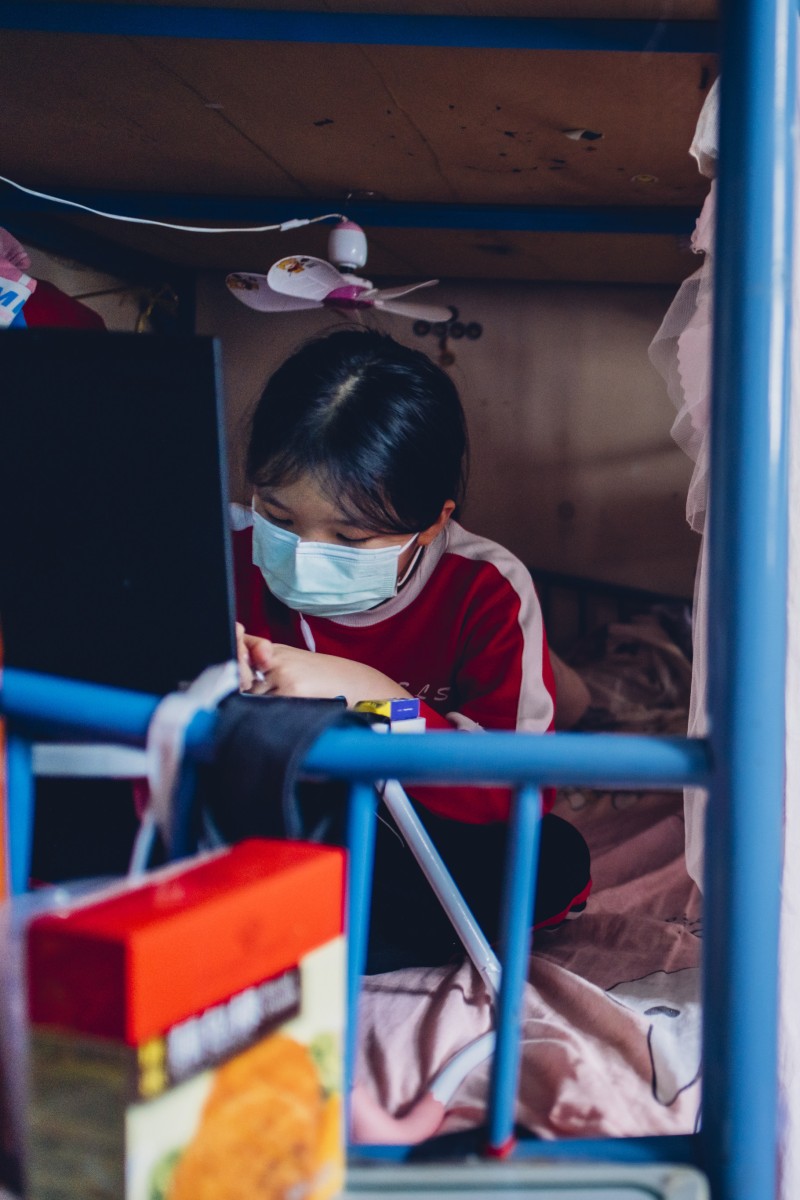
- City’s No 2 official has announced a scheme ‘Strive and Rise Programme’ to tackle cross-generational poverty
- Pilot aims to help 2,000 underprivileged junior secondary school pupils by pairing them with life-planning mentors and providing them with HK$5,000 start-up sum
 Hong Kong’s new “Strive and Rise Programme” aims to help 2,000 underprivileged students with financial and career planning. Photo: Brian Ching
Hong Kong’s new “Strive and Rise Programme” aims to help 2,000 underprivileged students with financial and career planning. Photo: Brian ChingFour Hong Kong Olympic medallists have been invited to act as tutors to junior secondary school pupils living in subdivided flats under a new scheme to tackle cross-generational poverty, the city’s No 2 official has announced.
These tutors include fencing gold medallist Edgar Cheung Ka-long, and women’s table tennis team members Doo Hoi-kam, Minnie Soo Wai-yam and Lee Ho-ching, who took home a bronze at the 2020 Tokyo Games.
Chief Secretary Eric Chan Kwok-ki is leading a new high-level anti-poverty task force. On Monday, he said the pilot “Strive and Rise Programme” aimed to help 2,000 underprivileged students with financial and career planning, enhance their communication skills and expand their social network. The scheme is set to launch in October and expected to last a year.
“These star tutors will increase the attractiveness of the scheme, so that grass-roots students will no longer feel that their development will be restricted by their network,” he said.
“Some may ask why only 2,000 students will benefit. This is a trial programme. We will expand it to cover more students after an ongoing review.”
The task force, one of the priorities raised by city leader John Lee Ka-chiu when he took office in July, is part of the new government’s efforts to alleviate poverty.
According to Chan, under the first phase of the subsidy scheme, a start-up sum of HK$5,000 will be given to 2,000 Form One to Three students who live in subdivided flats – tiny and often windowless homes plagued by hygiene and fire safety issues. If more than 2,000 applications are received, preference will be given to Form Three students.
Nearly 1 in 4 young Hongkongers from low-income families ‘lying flat’, feeling hopeless
Authorities will invite commercial organisations and professional bodies to nominate tutors. These tutors will assist students recruited through community groups and schools with life planning and how to make best use of the subsidies donated by the business sector.
“We hope to recruit more younger mentors because they can communicate better with the mentees. They should have a job and can arrange job shadowing,” Chan said.
Upon completion of the programme, another HK$5,000 will be awarded to students to fund their personal pursuits.
Others who have agreed to join the scheme as tutors are Dr Lo Yuen-yi, the University of Hong Kong’s associate dean of faculty of education, Hong Kong Harmonica Association founder Ho Pak-cheong, renowned conductor Yip Wing-sze and violinist Yao Jue.
Lo would give language lessons while the three musicians would teach music and how to play instruments, Chan said.
Activities for pupils would include group visits to public utilities, government departments and museums. There are also plans for them to take a short flight. Pupils can also choose to take classes in Chinese or English language, sports and music, as well as social etiquette.
Students will attend compulsory training sessions in topics such as communication skills and financial planning. Mentors and parents will also be given training.
What it’s like for a teen from a poor family caring for diabetic father
According to a government report, as many as 1.65 million residents, or roughly 24 per cent of the population, lived in poverty in 2020, up from 21 per cent in 2019. About 275,000 children aged below 18 lived in poverty before government intervention, up from 253,00 in 2019 and 235,000 in 2018.
It also represented a poverty rate of 27 per cent among children, up from 24.9 per cent in 2019 and 23.3 per cent in 2018.
The government estimates the city has about 110,000 subdivided flats – with more than 220,000 occupants – mostly in dilapidated buildings in Kowloon and the New Territories. Most are rented by singles or couples, but occupants also include single parents and their children, and even three-generation households.
Form Three pupil Kelly Lee said that while she would be interested in joining the programme, the quota was too small, the duration too short and the HK$10,000 subsidy too little.
“This is not a form of long-term support, it is more of a short- to medium-term subsidy,” said the 14-year-old who lives in a subdivided flat.
Using her own violin lessons as an example, she said a new instrument would cost at least HK$10,000 and the average fee for a class was around HK$300 to HK$400.
She said she hoped the scheme would allow her to gain a better understanding of her future career path, as well as visit events and places she had rarely been to such as concerts or theme parks.
Why low-income Hongkongers are being pushed from one temporary flat to another
Sze Lai-shan, deputy director of the Society for Community Organisation, said the scheme was a move in the right direction, but the one-year period was not long enough for mentors and mentees to develop a relationship.
She said the subsidy should be increased to HK$20,000 per student and more should be allowed to join. “This is why we are saying the breadth and depth of the programme is not enough,” Sze added.
More broadly, she said she believed the government should address problems such as the issue of the working poor and insufficient education funding and housing support for low-income students and their families.